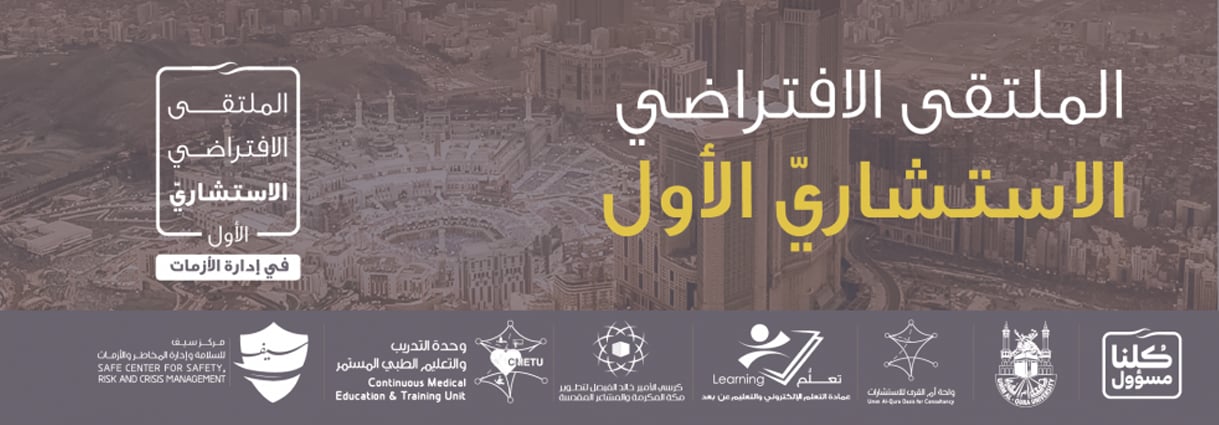
The Director of the UQU Medicine and Medical Science Research Center, Dr. Khalid Abul-Shamat, covered the reality of volunteering and the extent of its importance in managing the Coronavirus crisis, referring to the Jeddah flood incident and the volunteering momentum witnessed in the affected areas. The voluntary efforts at that time involved individual initiatives by the male and female youth of the nation, who provided necessary subsidies and equipment out of their own sense of social responsibility. These initiatives have proven that the sense of national belonging is a major driver for increasing the number of volunteers in the Saudi Kingdom.
This came during the sessions of the second day of "The First Virtual Consulting Forum on Crisis Management" organized by UQU Institute of Consulting Research and Studies. The forum, which lasted for three days, reviewed fields of crisis management relying on scientific and research strategies presented by specialist consultants.
Dr. Khalid Abul-Shamat attributed the lack of enthusiasm regarding volunteering efforts in the management of the Coronavirus pandemic to the community members’ expectations that the virus will end within a short period of time. However, the volunteers currently feel they have to act quickly with various field and electronic initiatives to address the crisis. He indicated that flexibility in keeping up with the events is one of the requirements in filling the community needs in different streams and continuing life from a distance, in line with the precautionary decisions to avoid infection transmission.
He added, "At present, we need initiatives from individuals, specialists and community institutions to organize the work in such a manner that serves volunteering needs in crisis management, particularly the youth due to their ability to deal with technology more easily compared to other age groups and their eagerness to contribute and work to create a positive change in the face of this crisis."
Dr. Talal Mandourah, Professor of Mechanical Engineering, outlined the practical steps of volunteering in crises with regard to the importance of implementing preventive safety concepts and emergency plans before the commencement of the work. He said such a matter is necessary to address the potential repercussions with preventive programs to maintain physical and mental health and safety. This is to be added to ensuring the regular maintenance of equipment to avoid any equipment breaking down and to achieve the desired goals.
Dr. Sumayyah Sharaf, Assistant Professor of Mental Health and Psychological Counseling, referred to the importance of boosting positivity in dealing with psychological and social influences related to the Coronavirus and reducing its impacts on society. This can be achieved by offering psychological counseling services during and after the crisis for all personality patterns requiring special treatment, according to how they accept changes and their behavior in this regard. She explained the role of the university and its different departments in managing the current status with educational, research, administrative and awareness services, relying on educational campaigns and courses or discussion sessions, as well as with material and moral support to overcome the crisis.
Dr. Faisal Baruwais, Assistant Professor of Exercise Psychology, focused on the importance of continuing physical activity while staying at home, being one of the pillars needed for a good quality of life, which affects the individual's health positively and strengthens their immune system in fighting diseases. He added that it also contributes to boosting the number of those who practice sport, thereby achieving the objectives of the quality of life program in the Saudi Vision at the local and international levels.